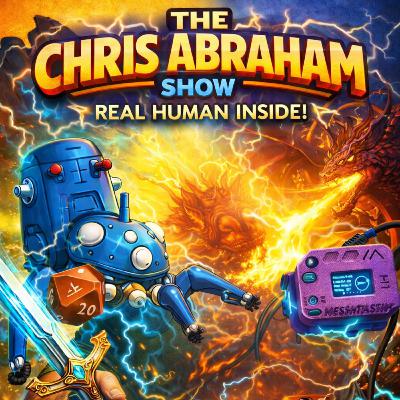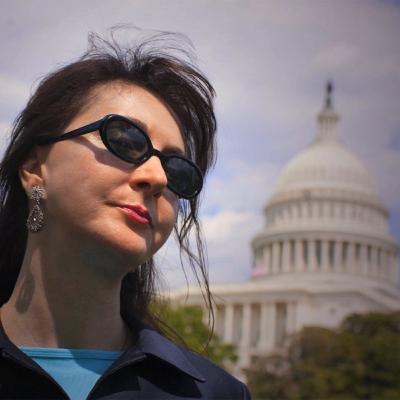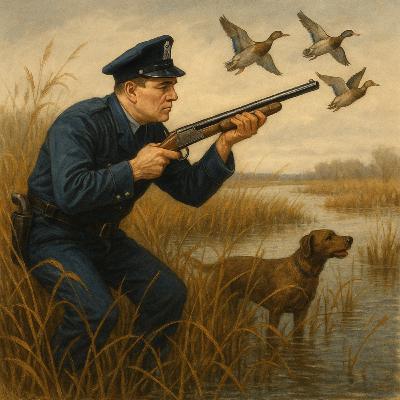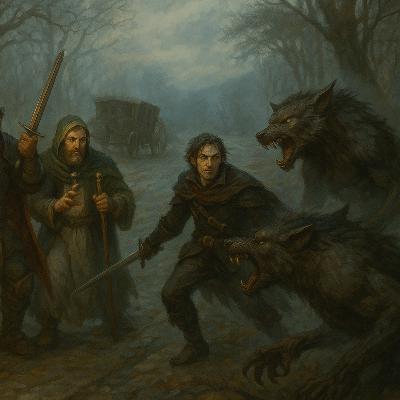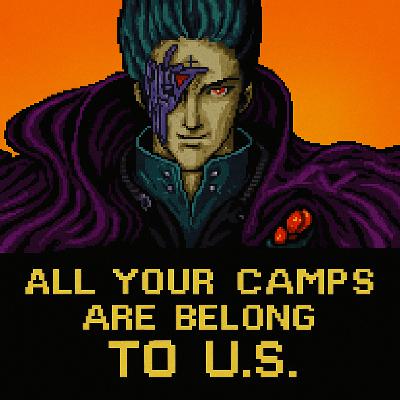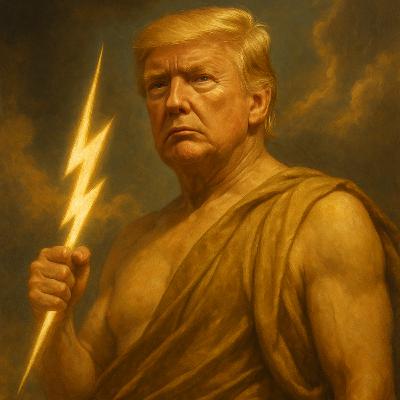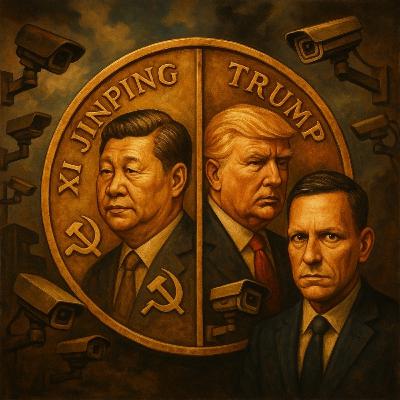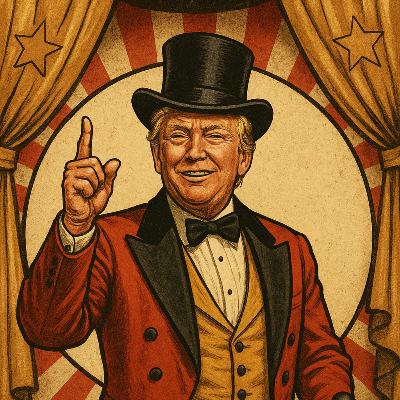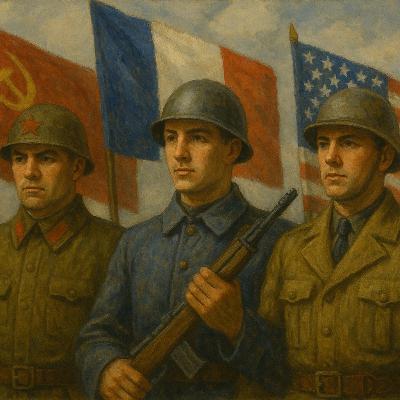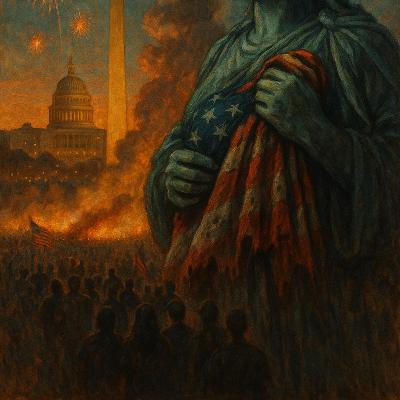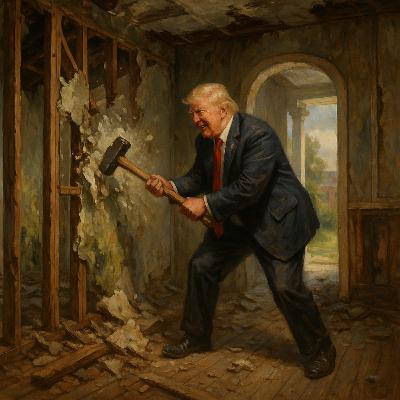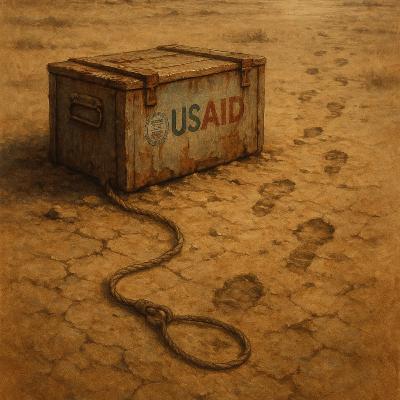Discover The Chris Abraham Show
The Chris Abraham Show

The Chris Abraham Show
Author: Chris Abraham
Subscribed: 2Played: 66Subscribe
Share
© Chris Abraham
Description
tl:dr: Just a 55-year-old cisgender white male mansplaining his own self-importance. But good.
Full Summary: The musings of Chris Abraham as he aspires to know the world and himself while getting healthy, losing weight, becoming fit, and running his small business while living in South Arlington, Virginia. Walk with him a while and see what's up.
Full Summary: The musings of Chris Abraham as he aspires to know the world and himself while getting healthy, losing weight, becoming fit, and running his small business while living in South Arlington, Virginia. Walk with him a while and see what's up.
450 Episodes
Reverse
Pupatella is a certified authentic Neapolitan Pizza restaurant as certified by the Associazione Verace Pizza Napoletana that has won multiple best pizza lists nationally.
No Agenda is a podcast hosted by Adam Curry and John C. Dvorak and takes place twice a week on Thursday and Sunday at 9 a.m. Pacific Time. The show is primarily focused on mainstream media deconstruction. Support the Show
John C. Dvorak is a columnist for PCMag.com and the co-host of the twice weekly podcast, the No Agenda Show. His work is licensed around the world. Previously a columnist for Forbes, PC/Computing, Computer Shopper, MacUser, Barrons, the DEC Professional as well as other newspapers and magazines.
Adam Clark Curry is a podcaster, announcer, Internet entrepreneur and media personality, known for his stint as a VJ on MTV and being one of the first celebrities to personally create and administer Web sites.
Order online for pickup at Walter Reed
Pupatella SOUTH ARLINGTON
1621 S Walter Reed Dr, Arlington, VA 22204
703-647-9076
Open every day of the week
Sunday-Thursday: 11:30am - 9pm
Friday-Saturday: 11:30am - 10pm
Closed all major holidays
Note: We clean our oven everyday between 3:30pm and 4:00pm. No pizzas can be made at this time.
I have decided to return to podcasting but only as an audio blog or an audio diary or just as a way of putting down my thoughts outside of the adversarial world. So, this really is just for me and not really to build it into anything. Just a creative outlet. This is just the shakeout episode in which I try out the new Sony ICD-UX570 Digital Voice Recorder I grabbed from Amazon and I plan to use anywhere and everywhere. Like that poet in Lower Manhattan who is constantly recording every single thing that comes through his mind, "the sky is blue, the night is dark, the water is wet." Deep stuff like that. I am him how. Living my best life. Enjoy.
This episode of The Chris Abraham Show is an unscripted, exploratory monologue that circles a single question from multiple angles: what happens to large war-oriented systems when they no longer have an obvious external war to fight?Rather than arguing for or against specific policies, this episode looks at structure, scale, and inertia. For much of modern American history, war has functioned not only as foreign policy but as an organizing principle for labor, industry, logistics, and federal spending. The Global War on Terror normalized enormous budgets, standing emergency authorities, and sprawling institutional ecosystems that extended far beyond the battlefield. Those systems trained people, built careers, created regional dependencies, and locked in expectations about what “normal” government capacity looks like.As external wars become harder to sustain politically and strategically, the question is not whether those systems disappear, but where they go. In this episode, immigration enforcement is examined not primarily as a moral or partisan issue, but as a systems problem. At scale, mass deportation and detention require transportation networks, facilities, staffing, courts, legal processing, medical care, procurement, and coordination across multiple layers of government. Structurally, it begins to resemble other national mobilization efforts the United States has undertaken during periods of crisis.The episode introduces the idea of a “deportation industrial complex” to describe the interlocking public and private systems that emerge around large-scale enforcement. This is not presented as a conspiracy or a claim of intent, but as an observation about how large bureaucratic systems behave once they are built. Any apparatus of that size creates economic, political, and institutional incentives for its own continuation, much like the prison system or defense contracting before it.From there, the conversation turns to the concept of a Domestic War on Terror, or DWOT, as a descriptive framework rather than a declared policy. The logic that governed the Global War on Terror did not vanish when foreign interventions slowed. It internalized. Categories of risk, emergency elasticity, and extraordinary authorities begin to operate inside national borders, often framed as administrative rather than military. The machinery remains largely the same; the theater changes.The episode also explores how protest, resistance, and public opposition interact with enforcement systems. Rather than assuming resistance always slows expansion, it looks at how visibility and escalation can sometimes become part of the feedback loop that sustains additional capacity. This dynamic is discussed without assigning blame, focusing instead on how systems respond to pressure.Throughout the episode, real-time statistical queries are used to contextualize fear, risk, and public perception, not to reach definitive conclusions but to illustrate how narratives form around numbers.This is not a call to action or a warning. It is an attempt to describe a recurring pattern in American governance: large systems tend to persist, normalize, and adapt rather than shut down. Temporary measures become permanent. Emergency budgets become baselines.Recorded as Season 10, Episode 2 of The Chris Abraham Show, this episode is intentionally exploratory and reflective, meant to be heard as a thinking-out-loud session rather than a polished argument.
After a long hiatus from live, human-voiced podcasting, Chris Abraham returns with the unofficial kickoff to a new season of The Chris Abraham Show. Call it Season 10, or just call it “one more than whatever came before.” This episode is less a formal broadcast and more a fireside check-in. No hot takes yet. No grand thesis. Just Uncle Chris catching up, taking inventory, and letting listeners back into the workshop.Chris opens by reflecting on a year spent experimenting with AI-assisted writing and audio. Substacks fed into NotebookLM. Podcasts assembled more like orchestration than performance. He likens himself to a Renaissance painter running a studio: sketch the idea, let the assistants fill in the canvas, then obsessively revise until it feels true enough to sign. It sparked conversations, which felt like a win, even if the whole thing occasionally resembled “DJ Slop.”From there, the episode turns personal. One week post-second ablation, Chris reports that his heart is finally humming along in sinus rhythm after a long struggle with atrial fibrillation. The first procedure failed and took the wind out of his sails, contributing to weight gain, lethargy, and a general retreat from movement. This time feels different. Better sleep. BiPAP nights. The cautious hope of eventually shedding some medications. The slow return to walking, cycling, kettlebells, and the familiar ritual of getting back in the saddle, literally and figuratively.Fitness and body discipline weave through the episode, including a rueful confession: Chris once tattooed a kettlebell on his hand as a motivational Hail Mary… and then promptly stopped lifting. Future tattoo ideas may include a Concept2 logo and the muted horn from The Crying of Lot 49, because symbolism apparently works better than guilt.Work life is steadier. SEO, Google Business Profile recoveries, and AI-adjacent consulting are keeping the lights on. But the real joy lately lives in the nerd margins. Chris dives deep into decentralized systems, inspired by Ghost in the Shell, particularly the sentient blue tanks that sync their “souls” to a server. That idea metastasized into a home-rolled infrastructure project: seven identical Lenovo ThinkPads running Linux Mint, all synchronized via a cloud droplet using Syncthing. Not a backup. A living sync mesh. Every laptop a node. Every document everywhere.That fascination with nodes and meshes extends into the physical world via Meshtastic. Chris recently deployed a LoRa-based radio node, ABRA (short for Abracadabra), hanging from an eighth-floor Arlington window, quietly strengthening a local, license-free mesh network. No voices. No feeds. Just short messages hopping node to node, old-school and strangely comforting. It’s part prepper tech, part early-internet nostalgia, part philosophical itch scratched.Elsewhere in the ecosystem: Mastodon survives for now at abraham.su, rescued at the last minute despite the .su clock ticking toward 2030. Micro.blog joins the stack under chrisa.micro.blog and ChrisA.org. Digital homesteading continues.Chris also shares the unexpected joy of joining a long-running Dungeons & Dragons campaign, Curse of Strahd, playing a stubborn Eldritch Knight named Radley, refusing to read the manual, and delighting in chaos alongside a group of grizzled old nerds on Discord. Dice are rolled. Plans go sideways. Everyone survives, mostly.The episode closes with quieter notes: a growing devotion to the Gospels, nightly Episcopal Compline prayers, the simple rhythm of rereading rather than rushing ahead. A Powerball ticket purchased. Gym plans deferred. Kettlebells waiting. A rowing machine sulking upright in the corner.This isn’t a manifesto. It’s a temperature check. A reintroduction. Uncle Chris is back, heart steadier, systems syncing, curiosity intact, and ready to spend the rest of the year talking through the small things before returning to the big ones.
Same Swamp, Different BroodThe DC Madam & the Secret That Still HumsClose your eyes: DC, late ‘90s into the 2000s. Suits at the Mayflower, steakhouse hush-hush deals on K Street, the kind of power that smells like dry-cleaned wool, stale cigars, and cheap cologne. There was no Tinder. No casual fling on a swipe. If you wanted vice, you went through the shadows — or you called Deborah Jeane Palfrey, the DC Madam.She didn’t run some back-alley hustle. Pamela Martin & Associates was an escort network for the capital’s respectable sinners: contractors, agency lifers, moralists with Bible verses on their lapels. Palfrey kept her insurance policy — a spiral notebook stuffed with names, numbers, and notes that could melt marble. The Black Book.She told the feds: If I go down, I take them with me. A threat like that should’ve cracked the swamp wide open. For a moment, it did. Randall Tobias — Bush’s AIDS czar — out. Senator David Vitter — Mr. Family Values — outed, then forgiven by his base because, well, power forgives itself.But that was it. The machine dribbled out just enough names to keep the wolves fed, then buried the rest. The notebook vanished into sealed court files. And Palfrey? She swore to reporters she’d never kill herself. In 2008, they found her hanging in her mother’s shed. Officially: suicide. Unofficially: she was the prototype for “Epstein didn’t kill himself” a decade before Epstein was the punchline.That’s the pattern: every so often, like a cicada brood clawing up through swamp mud, the black book returns. New names, new rumors. But the roots never get pulled. Epstein was the next cycle — kids instead of consenting adults, island flights instead of Mayflower hotel rooms, rumored Mossad cameras instead of a battered flip phone. The same cycle: names teased, a few low-levels tossed to the mob, the real ringmasters vanish behind sealed files.We like to think the moral panic back then was quaint — grown men sweating bullets over consenting sex work when now you can hook up on an app before your third cocktail. But the real taboo still stands: the blackmail, the kompromat, the buried evidence that would show just how much the moral scolds and law-and-order saints have always been the filthiest ones in the room.Pam Bondi teases Epstein files. Cash Patel shrugs there’s no list. Elon Musk huffs about betrayal. The base fumes: Where’s the list? They’ll be fuming decades from now, too. Because the truth is, you’re not on the team that gets to read it.Once, an escort scandal nearly cracked the Capitol. Now, even child trafficking by billionaires fizzles out behind a security badge and a sleepy courthouse clerk. Same secrets. Same hush. Same swamp.You feel that hum? It’s the cicadas. They’ll be back. The black book always comes back. The swamp always hums.It’s not the scandal that ever dies — it’s your hope that this time, the list might actually matter.
Why Surrender Is Still the Only EndgameThere’s a brutal truth people forget when they throw around words like genocide, war crimes, ethnic cleansing. Those words do mean something — but they lose meaning when they’re wielded like hashtags during an ongoing shooting war. Once you’re in the fight, the moral shield only works when you put the knife down.War is chess with live ammunition. You have pieces, you have power, you have moves that escalate. The moment you advance a pawn, you’ve agreed to the possibility it will be taken. The moment you swing a punch, the counterpunch is fair game. That’s not moral or legal — it’s the physics of force.In chess, resignation is civilized. You see you’re outflanked; you tip your king. Good game. In wrestling or Brazilian Jiu-Jitsu, you tap out before your arm snaps or your windpipe closes. It’s the grown-up way to say: I know I’m beaten. I’ll take my lumps now, live to fight again.But modern states — Ukraine, Hamas, proxies everywhere — think they can bend this rule. They escalate, they provoke, they swing, and when the bigger bear or the muzzled wolf responds, they shout unfair. They wrap themselves in the flag of victimhood, hoping a hashtag will do what the rifle couldn’t.It doesn’t work that way. The bear — Russia — spent 30 years tolerating the cheese wire of NATO expansion, buffer states lost, missile silos inching closer. It murmured the same line: Don’t take Ukraine. That’s the red line. When the noose was almost tight, the bear lunged. Inevitable. Ugly. Not nice, but predictable to anyone who reads the chessboard.Israel — same logic. It wore the moral muzzle for decades, letting the world watch every checkpoint, every stone thrown. It let itself be painted as Goliath while expanding settlements inch by inch. But the rules of engagement were always simple: Respond only to lethal force with lethal force. The moment Hamas paraglided into that festival, the contract flipped. The wolf took off the muzzle, and now the panopticon watches the claws do what they were always ready to do.Meanwhile, these players made themselves indispensable. Russia didn’t just hibernate — it built BRICS into a real counterweight to the dollar bloc, bonded itself to China’s energy hunger, and kept India and the Global South just friendly enough to shrug off sanctions. Israel, humiliated daily in the press, quietly fused itself into Western security, tech, and intelligence. You can hate it — but good luck cutting it loose without sawing your own nerves in half.And the backers? Ask any student of revolutions: you don’t win without a patron. The US didn’t beat Britain on pluck alone — France footed the bill and sailed the fleet. Ukraine survives because NATO bankrolls the fight. But patrons hate throwing good money after bad. The moment the math says you can’t win, they count their chips and walk away.The resignation clock. The tap out. The white flag. If you’re losing — badly, hopelessly — you accept that you’ll probably lose territory, sovereignty, credibility. You might get a Versailles, a new border, a blockade. It’s humiliating — but it’s survival. You don’t get mercy while you’re still swinging a hidden knife. You don’t get pity from the bear or the wolf until you truly drop the blade and stand down.It’s not fair. It’s not moral. It’s just the savage contract under the chessboard: when the board turns red, you either resign or you bleed out. The rest is propaganda, and the pieces don’t care.Cry uncle before your king topples for you. War doesn’t end because you lose — it ends when you admit it.So what’s left?
A quiet bird can’t be shot. A hidden fish can’t be netted. A calm suspect cannot be tagged and fed into the system. This is older than any badge or slogan. Force survives by flushing what hides, tagging what flushes, and feeding on what shows itself. Everything else is theater.Any enforcement system needs visible prey. No visible crime or defiance means the budget shrinks and the dogs stay in the kennel. But a pond stocked with performative rage and careless bravado keeps the hunters fed. That’s why the same body cam footage repeats the same lesson: the people who flap their wings keep the machine alive.The Matrix gave us the allegory. There, human bodies power the system. Here, it’s your behavior. Every unnecessary word, every challenge posed like a dare, every “What did I do?” shouted when silence would have served you better — that’s the charge that lights the trap. It doesn’t matter if you’re a billionaire’s daughter in a Range Rover or a kid with no shoes — once you flap, you’re visible.It always begins small. A broken taillight. An expired sticker. If you stay calm, polite, and small, you slip back into the brush. But if you puff up, if you make it about pride, the dogs come closer. The stop becomes a search. The search becomes resisting arrest. A fine that could have cost you an hour now stains your record for life.Many believe status will protect them. They believe the net knows bloodlines. But when the shark’s eye goes blind, everything moving is meat. The dash cams prove it daily — a bored princess can be chewed up as easily as a trap baddie when they run their mouth.This cycle isn’t accidental. Even the slogans that claim resistance — “F*** the police,” “Defy or you’re a bootlicker” — keep the pond stocked. The system doesn’t need you to win; it needs you to flap enough to be worth catching.The hardest truth is that once you’re in the net, you’re not solving a logic puzzle — you’re rolling dice you can’t control. Gun owners know this: never draw unless you must, because you can do everything right and still lose the roll. One angle of video, one DA looking to make a name, one jury with a grudge — that’s all it takes.No trap is fair. It is not cowardice to stay small. It is not betrayal to comply. It’s survival in a world run on force. Obscurity is the shield. Defiance is the bait. The machine does not care who you are. It cares only that you’re big enough to catch.When the net tightens, stay small. When the dogs flush the bush, stay still. Pride feeds the trap. The bird that never flaps is the one that lives.
Date: June 29, 2025Players: Sean D. (Sören Ironwood – Aasimar Paladin), Chris (Radley – Human Fighter), Carey (Traxidor – Half-Elf Cleric), Trip (Daermon Cobain – Half-Elf Rogue)Filed Under: Curse of Strahd, Gothic Horror, D&D RecapsTwelve days in Barovia and each dawn feels like dusk. At the Blue Water Inn, a messenger arrived with a letter sealed in wax — Strahd von Zarovich’s invitation to dine at Castle Ravenloft. Radley, their sardonic Eldritch Knight, joked about wine with the Devil. Traxidor, cleric and conscience, argued no. Sören, the Aasimar Paladin, nearly growled at the thought of bowing to Strahd’s civility. Daermon Cobain, rogue and blade, said little — his coin flicking through the shadows.They refused. There would be no supper with monsters — not yet.Morning brought nails hammering declarations into timber. Lady Fiona Wachter now called herself Burgomaster of Vallaki by the will of the mob that strung up the old Baron. Her orders stripped the last hope from the town: worship of the Morning Lord forbidden, a curfew enforced, all must bow to her Reeve. And every young woman? Inducted into her “Society of Vallaki’s Maidens” — loyalty by marriage or worse.They walked the scorched town to the crackle of funeral pyres, then turned into Blinsky’s Toys, where horrors wore porcelain smiles. Gadof Blinsky, a jester with a monkey named Piccolo, sang his eerie line: “Is no fun, is no Blinsky!” They found a doll identical to Ireena Kolyana — Strahd’s stolen love. Blinsky confessed he made dozens for Izek Strazni, the Baron’s monstrous enforcer, who always wanted more. The party left with the doll and an unease that clung like a damp shroud.At the looted manor, they found the Baron’s son Victor’s hidden attic lab. The door’s Glyph of Warding nearly dropped Sören, but inside they found more grim trophies: animated cat skeletons, mannequins facing the wall, and a broken teleportation circle — an escape gone wrong. A dead end — yet the footprints in the scorch marks said someone had tried.Next, they dug up Miloj’s grave and learned the bones of Saint Andral had been sold to Henrik van der Voort. At his coffin shop, they found the crates cracked open, dirt scattered — and Henrik himself, torn to ribbons, his entrails smeared across the walls and ceiling. They cut off his head like a butcher dressing a pig and took it as proof, though no bones remained.At dawn, they rode with the Martikovs’ wine wagon to Krezk. Sören, ever devout but unhinged, flayed the flesh from Henrik’s skull on the road. The Martikovs threatened to dump the barrels if the barbarity didn’t stop — until three peasants begged for silver to fight werewolves. In moments, they revealed their fur and fangs. The Martikovs fled with the wine, yelling for the party to run. But the adventurers stood their ground: blades flashed, holy power sparked, and two beasts fell before the last vanished into the mists.Saint Andral’s bones are lost. Lady Wachter rules in Strahd’s name. The Count’s invitation still waits on a table set for guests who haven’t yet come. And the mists? They watch everything.Subscribe to follow every step deeper into Barovia’s throat. 🦇
In “Will We Tolerate Concentration Camps and Slave Labor?”, Steven Beschloss warns that America may be on the verge of something monstrous: mass deportations, labor camps, and forced work that echoes the worst shadows of our history. But the real horror is simpler: these camps already exist. They never went away. And they’re not some accidental glitch of the system — they are the system.The truth is that the U.S. economy has always needed an underclass it could threaten, cage, or bind in debt. The plantation did not vanish in 1865; it changed its paperwork. The overseer’s whip became the convict lease, the sharecropper’s debt ledger, the prison time sheet, the coyote’s contract. Each new generation simply renamed what it could not live without.Today’s migrant laborer does not wear shackles — he carries a coyote’s debt and a cartel’s threat. She picks strawberries under the eye of a labor broker who knows she will never report wage theft, because ICE is more terrifying than any labor law. And when these families are caught, the children are separated not because cruelty is new, but because the state never keeps kids in cages with parents. This is not a glitch — it is the design.America’s “labor shortage” is the overseer’s confession. Half our farmworkers are undocumented. Most owe thousands for smuggling fees. They do work Americans can’t or won’t do at that wage. Remove them, and the fields rot. Legalize them, and the price of produce skyrockets. You don’t want to see the cage because the real cost of opening it is higher than you’re ready to pay.Beschloss calls for CEOs to pledge not to buy forced labor. But every grocery aisle already is. The real pledge would be to pay a wage that makes the debt chain break — to pay more for fruit, meat, roofs, and roads. We could do it. But we do not. And so the invisible camps persist: the fields, the processing plants, the basement kitchens, the prison workshops. Slavery by any other name.The “decent Americans” Beschloss invokes want to protest the visible camp — the fence, the cage, the children on the floor. But they do not protest the debt, the fear, the cartel’s hold, or the loophole in the 13th Amendment that lets prisoners work for pennies. The chain has never broken. It just runs deeper underground every time we promise we’ve outgrown it.The next time you hear that the deportations will cause a “labor crisis,” remember what that means: a plantation owner admitting he cannot run his fields without bondage. We can break it. We can pay the real price. But you have to say it out loud: cheap food, cheap labor, cheap freedom — these things cost someone else everything.The question is not “Will we tolerate the camps?” The real question is: What will you do when they’re gone? Will you pay the price you owe? Or will you rebuild them, behind new fences, with new names, and pretend again they are someone else’s problem?All your camps are belong to U.S.They always have been.
So much modern talk about policing rests on a wish: that the officer showing up at your worst moment is a hybrid — therapist, social worker, priest, and protector — who can fix every chaotic life story with infinite patience. But the reality is older, harsher, and simpler: the officer is a guard dog, not a Saint Bernard with a cask of mercy.The old “beat cop” we romanticize — the Irish Bobby tipping his hat on a city stoop — was never your confessor. He was there to keep the reckless few from turning your street into an alley no one trusted after dark. “Protect and Serve” never meant protect the one swinging fists at strangers; it meant protect everyone else from him.That basic truth is why every cop calls himself what the badge says: LEO — Law Enforcement Officer. Not Law Negotiation Officer. Not Neighborhood Mediation Officer. He carries the law the broader public agreed to — imperfect, sometimes unjust, but not your private code or your street’s whispered deals.Yet look closer and you’ll see the paradox. Pick up a battered police trade-in Glock: the slide and frame are scarred from thousands of holster draws — a sign that deterrence is the point. But inside, the bore is nearly pristine. Most officers fire fewer live rounds in training than a hobbyist does in a single weekend class. They are underfunded, undertrained, yet asked to stand as the last line between the quiet majority and the wolf at the door. In DC, accidental self-inflicted shots are so routine they have a name: “getting bit.” It’s not just sloppy — it’s the proof that we expect perfect control without paying for the discipline that makes it possible.If you want a softer response, remember this: the guard dog’s bark only works because the teeth are real. Take that away, and the wolf sniffs the fence and climbs right in. Even your comic book heroes get it: Spider-Man doesn’t chat up a purse-snatcher about childhood stress — he webs him up for the cops. Even in fiction, we know that law must draw a line.From the 1930s beat cop learning by rumor, through the riot-trained 1970s patrolman, to the post-9/11 “homeland security” officer, the role has always been the same: protect the majority from the chaos-makers when all else fails. Some places have improved. Many haven’t. The average American cop still trains fewer hours than a barber’s license requires.So be clear-eyed. A police officer is not your paladin or savior. He is not your redemption story. He is the state’s answer when the social fabric frays. If you want him to bark less, build a world that needs him less. Until then, do not be shocked that he carries a weapon he barely fires — or that when he does, the bite is real. Better to know what the guard dog is — and what he is not — than to stand unguarded when the fence gives way.Field note closed.
How America’s Godless Made a Thunder God Out of a Mortal ClownI saw someone on Reddit shrug: “The thing is, he’s actually responsible for stuff. He’s the president.”And that’s it, isn’t it? In a country that once thought presidents were just men in suits, we’ve built one who rains bunker-buster thunderbolts like Zeus. Not by accident — by hunger. By a god-shaped hole in a nation that told itself it didn’t need a god at all.It started as a joke. A clown descends the golden escalator — half Golem, half carnival barker — forged out of the flyover states’ raw clay. A tulpa of every grievance that polite America forgot about: open borders, closed factories, global wars fought by kids from nowhere towns. His people breathed him into being like villagers summon a protector. Not a god — just a hammer.But the other tribe, the self-anointed rationalists, the coastal priests of data and democracy, never understood that you don’t banish monsters by screaming at them. You feed them. Every headline, every effigy, every “literally Hitler” chant was fuel for the fire. The villagers marked their lintels and said, “At least he’s ours.” The priesthood went blind with eclipse fear. A scapegoat is a trickster until he grows too big to burn.Now it’s July 2025. He’s the 47th president — swing states by landslide, electoral and popular votes. He walks the West Wing like a man wronged, spending four years in exile plotting every bunker plan, every drone fleet sortie, every wall and raid and black budget operation. He doesn’t ask permission — he asks forgiveness later. Or never. He knows the fear in your bones, the one that says, “What if he really can smite me from 8,000 miles away?” And you’re not wrong. With the Patriot Act still humming, with post-9/11 tools still sharp, the Zeus we built can flick his wrist and the century trembles.It’s not just tulpa magic. It’s not just a paper god. This is a real empire with 800 bases, an 800-billion-dollar defense spigot, a thousand little Caesars running cover. And the “Never Trumpers” keep screaming, “He’s poopy pants! He’s senile!” while he stands there naked and radiant, thunderbolt in hand, saying, “You know exactly who I am.”Every mural, every “Never Forget” wall, every daily exorcism is supposed to shrink him back to mortal size. But old magic knows: burning an effigy keeps the flame alive. The villagers built a quarterback, a Champion — not a savior. They know he’s a clown. But they also know the crops grow behind the golem’s wall. And the other side? They keep howling that the sky god wants your firstborn. Maybe they’re right. Or maybe they’re feeding him with every scream.When the plague hits or the flood comes, they point up at Olympus: “Trump did this. Trump killed them. Trump broke the world.” And so the trickster tulpa — the clown golem — ascends the storm clouds, pulling the old sun god’s mask over that famous hair. Zeus the Trump. Smiter of cities, ruler of the surveillance state, king of the village circus.Don’t misunderstand. He won’t live forever. Champions break. Golems crumble. But the villagers know how to bury their dead. The priesthood does not. They’ll keep the ritual alive long after he’s dust, waiting for the next eclipse.Amen.
There’s an ancient fear that always asks: Who did this? Who angered the gods? When storms crush fields or floods drown children at camp, our ancestors blamed Ba’al, Moloch, Ra — anything to put a face on chaos.Modern Americans pretend we’ve outgrown this. We trust policy, science, data. But scratch the surface and the eclipse fear is still there, buried under hashtags and TED Talks. And the moment the river rises, the blame returns: “Trump did this.”When a wall of water smashed Hill Country, the rational class didn’t just mourn or question zoning codes. They built the old altar: Trump cut the staff, Trump made the storm. The scapegoat logic never died; it just swapped robes. The “coastal priesthood” who mock faith became accidental sun worshipers — burning effigies, chanting curses, feeding dread into a single name.The faithful have always spoken of a God-shaped hole — a quiet space in the heart for something larger. If you seal it up, it doesn’t vanish; it mutates. These modern apostles of reason filled that hollow with status and credentials but kept the animal dread. The hole stayed. And fear found its Trickster.They made Trump into the Forrest Gump of their apocalypse — but reversed. Not the clueless bystander in every photo, but the hidden cause they see in every flood, every suicide, every riot. He’s the cosmic spoiler who ruins the final moral scene they rehearsed since their grandparents marched in Selma or liberated camps in Europe. They dream of being the vanguard who ends fascism forever — but the Golem of flyover country hijacked their Moonshot.They hate him so much they keep the ritual alive. Giant baby blimps. Dart boards. Hashtags. The effigy burning never ends. But old magic knows: burn the doll long enough and you feed the thing you fear. Their constant dread turned a mortal buffoon into an accidental tulpa — a thoughtform, an egregore, fed by every “Trump did this.”Meanwhile, the villagers who made him never saw him as a god. He’s a flawed champion — a clay battering ram to guard picket fences and potlucks while the coastal priesthood tries to finish the moral exorcism. He was never their savior. Just a stand-in while they hold on to their Groom, their faith, their leave-it-to-Beaver quiet.In the end, it’s the so-called rational who keep the fire burning. They think they’re defeating a villain but they’re conjuring a Trickster sun named SOL — an orange eclipse they can’t look away from. What started in the head dripped down into the heart. They became accidental Jesus freaks for the very monster they swear they hate.If it floods like a god, punishes like a god, devours like a god — it’s a god. Not for the villagers who built a clay champion, but for the ones who can’t stop worshiping the fear.The Trump-shaped hole isn’t just in their heads anymore.And they’ll keep the fire burning.Amen.
When Silicon Valley and the CCP Start Speaking the Same LanguageLet’s get real: the world’s two most powerful nations are building surveillance societies. The United States, under a new breed of techno-ideologues, is quietly constructing a digital control system that mirrors—sometimes eerily—the one perfected by the Chinese Communist Party (CCP). Pull back the curtain and you see the same machinery: data, algorithms, and the relentless drive to know, score, and shape every citizen. The difference? Only in branding and the stories we tell ourselves.Peter Thiel: Architect of America’s Surveil-and-PunishTo understand this convergence, look at Peter Thiel—billionaire investor, PayPal co-founder, and intellectual godfather of the New Right. Thiel isn’t just a financier; he’s a philosopher-king for this era. His books, speeches, and investments have seeded a generation of politicians and policy architects who share his skepticism of democracy, faith in hierarchy, and obsession with managing human desire.Thiel’s fingerprints are everywhere: from his early Trump support to his funding of “anti-woke” candidates and investments in the backbone of the American surveillance state. He bridges Silicon Valley’s monopolists and the populist Right—a connector of memes, money, and power.Surveillance: The Water We Swim InWhat we once imagined was only the CCP’s playbook is now American standard. The same tech used to track Chinese dissidents now monitors gig workers, protestors, immigrants, and minorities. Since 2016, US surveillance has expanded dramatically—not just at borders but in cities and online. Trump’s executive orders empowered DHS to scrape any “publicly available information”—tweets, Facebook posts, even private messages. The chilling effect was immediate: people self-censored, deleted posts, and warned each other that “anything you say can be used against you.”The Memetic Engineering ComplexSocial media doesn’t just sell ads—it sells influence. Its algorithms maximize engagement by amplifying outrage, envy, and tribalism. Since 2016, these platforms have become tools for both state and mob enforcement of ideological conformity. Predictive policing powered by social media data has monitored protests and flagged “agitators”—an approach straight from the CCP’s dissent-control manual.State-Corporate FusionIn China, tech companies must share everything with the state. In the US, the state contracts it out, but the effect is similar: a seamless flow of data from your phone to power. The “public-private partnership” is the new Leviathan—and it’s bipartisan. Thiel’s investments in Palantir and Facebook are the logical extension of his belief in hierarchy and the management of desire. Trump’s circle sees these tools as the way to restore “order” and “greatness,” even while railing against “big tech.”Targeting the OutsidersThe CCP’s surveillance of Uyghurs is notorious. In the US, ICE used social media monitoring to build deportation cases—even for US citizens with immigrant ties. The logic is the same: identify, isolate, neutralize. Only the branding differs.Harmony vs. OrderThe CCP talks about “harmony” and “national rejuvenation.” Trump and the New Right talk about “order” and “greatness.” Both are code for control—managing risk and channeling the violence of mimetic desire away from power. Thiel’s skepticism of democracy mirrors the CCP’s distrust of pluralism. Both see the crowd as dangerous, the individual as a threat.Denial and CamouflageThe CCP is honest about its authoritarianism. The US cloaks it in “law & order” and “border security”—but the surveillance engine hums the same tune.No Place to HideIn the end, the line between “free” and “unfree” blurs. The only real question is who pulls the levers—and whether we can imagine a world where data empowers rather than imprisons.
TED Radio Hour: The State of FashionTED Radio Hour: Supermodel Cameron Russell says she helped a 'grotesque industry' look beautifulI listened to Cameron Russell on NPR’s TED Radio Hour talking about her memoir — how she was scouted as a teenager, how she tolerated “grotesque” things: the S&M vibe, the creepy photographers, the being called “jailbait” at 16. She calls it what it is — an industry built to sell the male gaze, profit off young women’s bodies, and spit them out later.My first reaction? Rage. The same feeling I’ve had since I dated a woman with Elite Petite in NYC. She was tough, beautiful, wild — we’d be out with a motorcycle club, or she’d head to 12-step conferences alone, so brave it terrified me. I felt brother, boyfriend, father all rolled into one. Because when things go bad for me, maybe I get a black eye. When things go bad for a woman, she might end up dead in the dirt.So my gut says: Shut it down. Replace every real girl with a perfect AI avatar. They never starve, never get trafficked, never sue. Insurance companies would love it. The brands too. Problem solved.But it’s not.It’s easy to focus on the big runway names — Cindy, Naomi, Cameron. But modeling is a whole messy ecosystem. It’s showroom girls in Atlanta, local department store ads, cruise ship performers, Instagram micro-influencers, ring girls, OnlyFans, beauty pageants. There are actor-models, model-actors, TikTok stars selling bikinis from their bedrooms. You can’t “fix” that by swapping out the top layer with digital dolls. The hunger for beauty and attention just leaks sideways.Plus, we keep forgetting the real tension: agency. These girls are brave as hell. They choose it — and they often know the cost. The world claps for 14-year-old gymnasts starving to make weight, chess prodigies living alone at 15. But a teen model? Suddenly we treat her like a helpless baby lamb.Look at Sydney Sweeney. She’s one of the most objectified actresses alive — big boobs, big gaze, big deal. But she wasn’t groomed and clueless. She made a PowerPoint for her parents when she was a teen, explaining exactly how she’d become famous. Plan A, B, C. That’s a grown-ass woman in the making. Brave enough to out-hustle the wolves.That’s what I come back to every time: She’s not my daughter, and even if she was, she’s not my property. If a young woman’s smart enough, savvy enough, and wants it badly enough, who am I to bubble-wrap her? The real fix isn’t deleting the humans — it’s guardrails, real consequences for predators, and respect for the ones who walk in eyes wide open.AI won’t save girls from bad choices. It’ll just kill their shot at agency and earnings. Meanwhile, the same men cash the same checks.I believe Cameron’s story. The industry is cruel. But the solution isn’t to erase risk — it’s to trust the brave and fix the system. Because when you swap real humans for perfect avatars, you don’t just protect the vulnerable. You erase the ones who’d risk it anyway — and sometimes win.At the end of the day, that’s the messy, grown-ass truth. And I’d rather stand next to a brave woman with scars than a flawless doll that can’t say no — or yes.
The Trickster as 47th President by Chris AbrahamDonald Trump was always easy to sneer at. He was a tabloid punchline long before he was the gold-plated game show boss my mother adored. The Apprentice was her favorite. I rolled my eyes. He was tacky, vulgar — a human golden toilet. We told ourselves he’d never be more than that. Yet here we are: he’s the 47th President of the United States. The only non-consecutive two-termer since Grover Cleveland. But Cleveland never danced to the Village People’s YMCA more often than the cover bands. Trump does it at every rally. He does the stiff-hipped monkey dance, gives you the same punchlines, the same nicknames, the same red meat, and when the haters turn it into an obscene meme — he grins and does it again.Most presidents beg you to respect them. They want the hush when they walk in. They correct you if you use the wrong honorific. They bristle when mocked. Hillary carried her résumé like a holy relic: “Respect me, I’ve earned this.” Biden snaps “Come on, man!” every time the mask slips. Obama, the professorial jazzman, stayed cool until the press poked too deep. Bush Sr. was so polite he looked weak next to Bubba’s sax. Nixon taped his own paranoia. Carter lectured the country into a mood swing. Ford fell, Chevy Chase made him fall forever. But Trump? He lives for your laughter. He wants the jeers. He wants you to call him Donnie, DJT, a clown — because then you’re in the tent. He’s the trickster who cannot be shamed. He turns every insult into merch. Every meme is another ticket sold.This is the piece the Beltway never got. They think “dangerous demagogue” means barbed wire camps and midnight helicopters. But America doesn’t do Pinochet. Trump’s coup was the vacuum: the working middle he stole while the party of labor became the party of brunch. The union dads who went from FDR to Lock Her Up. The old Dixiecrats who realized they’d rather be insulted by a clown than scolded by the class valedictorian. He didn’t bring tanks — he brought the carnival.They call him a “wannabe dictator” because he never quite becomes one. Four years in office, and no mass roundups. Now he’s back — pushing 80 — constitutionally capped at one final term. They insist the sequel will be the real nightmare. But here he stands, arms wide, the same routine, the same golden hat. The same monkey dance. If he were truly the next Mussolini, he’s the worst at it in modern history.People want a trickster who won’t flinch. The whole country is a hazing ritual: your tribe tests if you can be mocked, if you crumble. The presidents who survive know how to laugh it off. The ones who can’t — they fade. Trump is the bar comic who never breaks under hecklers. He keeps selling you the same show. He knows the final trick is mortal — the lights go out in 3.5 years. But until then, the moral is the same:Never underestimate the man who never asks you to respect him. In America, that’s the oldest magic trick there is.
What We Forget When We Remember OurselvesEvery Fourth of July I get this itch — not to dunk on the country I love, but to scratch at the paint and see what’s underneath. To lift the floorboards, find the roaches, and point out that this grand old house we celebrate didn’t get built by one guy with a hammer.The American story is the greatest solo act ever told. Lone hero, lone cowboy, lone genius. We love it. We teach it in schools, we wrap it around our boots and our beers. Independence Day itself is practically a national tattoo that says: “We did it alone.”But the truth is that independence was born out of interdependence. You don’t have to be a cynic to admit it — just an adult.Start with the Revolution. The French didn’t show up with baguettes and hot air balloons; they showed up with a navy that made Yorktown possible. The decisive siege that ended the war? French ships blocked the British from getting supplies or reinforcements. Admiral de Grasse’s fleet outnumbered the Royal Navy at the Chesapeake. Rochambeau’s 5,000 troops fought alongside Washington’s. And yet how many stars-and-stripes parties this week will have a single French flag? We remember the ragtag farmers; we forget the ships and the loans and the French sailors buried far from home.Move forward to WWII. Our national myth goes something like: we parachuted into Europe, kicked Hitler in the teeth, handed out chocolate bars, and went home heroes. Did we matter? Of course we did — but the Soviet Union lost upwards of 20 million people grinding the Nazi war machine to a pulp on the Eastern Front long before we waded onto the beaches at Normandy. Stalingrad alone saw two million casualties. Eighty percent of German military deaths happened over there, not over here. The Red Army did the bleeding; we did the liberating — and the remembering, mostly just of ourselves.And what about the ideas we cling to? Liberty, Equality, Fraternity — the French didn’t just send ships, they sent the Enlightenment. Franklin didn’t hole up in London when he wanted revolutionary inspiration; he lived in Paris. Jefferson, Adams, the whole founding crowd were drinking deep from Rousseau, Montesquieu, Voltaire. Our DNA is part Parisian salon, part colonial farm. But we tell the story like we invented the ideals out of thin New England air.This is not about tearing down the Fourth of July. I’ll watch the fireworks too, maybe get misty when the rockets glare. But while we’re celebrating our freedom, I’d like to remember who else paid the bill. Because the American experiment, the thing that survived King George, Napoleon, Hitler, Stalin, and whatever comes next — it never stands alone. It never did.Civil wars, revolutions, world wars — none of them happen in a vacuum. They’re proxy fights, alliance fights, dirty trades of blood and treasure. America stuck its toe in Afghanistan to break the Soviets. France stuck its whole boot in our revolution to break the British. Someday, if we ever break ourselves in another civil mess, do you think the world won’t come poking around? Mexico, China, Russia, Europe — everyone will have a stake.History is not a lone genius with a patent. It’s a crowded lab. It’s the professor taking credit for the breakthrough while the grad students wash the beakers. And if we keep forgetting the beaker-washers, the next time we need a partner, they might just stay home.So raise your flag. Cheer the myth. But spare a thought for the French sailor in the Chesapeake, the Soviet grunt at Stalingrad, the philosopher in a Paris café who gave our founders their slogans. A Declaration of Independence, sure — but one signed with borrowed ink.
It’s the Fourth of July and Congress just crammed through the Big Beautiful Bunker Buster Bill — 870 pages of fences and tax cuts, border walls and missile domes, detention dollars and pork for the same contractors that keep the monster fed. Some people scream it’s our Declaration of Independence from decline. Others swear it’s Auschwitz 2.0 with better branding. Maybe it’s both, maybe it’s neither. Because none of this started with Trump — he’s just the cold sore on America’s lip. The infection was always there: the old gag reflex that kicks in when people sense the melting pot is being replaced by a stone soup no one wants to stir.I stand outside the gas station at one in the morning, Virginia blacktop still warm, Budweiser 40 in hand. This is my classroom. The drywall kings gather here, the guys who taught me Spanish because they never needed my English. They don’t want the flag or the anthem. They want the hustle: twelve-hour days, cash under the table, eighty percent wired home so a mother can pour a concrete floor, buy a motorbike, build a block house on a farm that gave them nothing. They know the deal. They know if they slip out before ICE comes, they can sneak back when the White House flips. They know America needs them invisible — cheap labor to keep the fruit cheap, the lawns clipped, the lettuce crisp.It’s not freedom. It’s not a cage either. It’s the same old handshake: your sweat for our cheap comfort. Meanwhile the polite kids on social media rage about fascism and concentration camps, but they never show up in the parking lot. They never see the wire transfer slip through Western Union, the way it props up whole villages better than any World Bank loan. They don’t see that for every real refugee, there’s ten who are hustlers, opportunists, or just poor bastards dropped off at the gates when some country empties its prison or asylum ward to keep the homeland clean.I love these guys. I love that they’d marry me off to a cousin in Huehuetenango if I asked. I love that they’ll stand in the lot and laugh about drywall dust in their lungs and the cousin’s boat they’re gonna buy when they go home kings. They’re not here for the American dream. They’re here for the ten-year lifeguard gig. It’s the Bulgarian pool boy hustle all over again, just longer, dirtier, and no one’s honest about it. The monster that eats this labor calls it liberty. The monster that locks the door calls it security. It’s the same monster.And so the fireworks explode over the Capitol dome while the remittance pipeline hums south. The fence stands half-finished, half-forgotten. The soup keeps boiling. Some bring their stones. Some just drain the broth. The gag reflex comes and goes. The cold sore flares. Trump didn’t invent this. He just shows you where it hurts.There’s no fix in this. No “No Kings” chant makes the parking lot vanish. No shiny bunker-buster bill makes the drywall king plant his kids here for good. This is America’s liminal edge: a place where you stand barefoot on warm blacktop, Bud heavy in your fist, Spanish on your tongue because you needed it more than they needed yours. No solution, no ending, no plan. Just the yawp. Toro bien. Todo bien. Happy Independence Day.
The Secret Safety Net We Pretend Doesn’t ExistYou can live your whole life in this country without ever seeing the crawlspace you’re standing on. America has always flirted with the idea of a safety net — food assistance, cheap clinics, housing vouchers — but never enough to make it real in daylight. Try to codify a European-style welfare system here and you’ll run headlong into the one thing voters agree on: taxes feel like theft. Better dead than red, they used to say. They meant it.So we build a workaround instead. We keep Dad’s “no free rides” sign nailed to the fridge, but Mom slips you a folded twenty when he’s not looking. The churches, the Peace Corps, the food pantries, the “private” non-profits — all humming on the hush-hush drip of federal dollars and tax breaks we pretend are charity. It’s a black market of democratic socialism. A secret fridge in the basement that keeps half the family fed without ever saying the word “entitlement.”To the 30% — the Zohran Mamdanis, the real social democrats — this basement is roses. Proof America still has a heart, even if it beats in the dark. But to the other 70% — the Iron Dad bloc — it’s mold. Moral decay. The smell of other people’s laziness rotting the beams you paid for with your sweat. Same fridge, same kids on the futon. Roses for you, rot for them.This is the contradiction that can’t last forever. The workaround lives or dies by the lease. If Congress won’t pass it, if the people won’t vote for it, it survives by executive order alone — one pen stroke away from erasure every four years. And the next Iron Dad always comes. Trump wasn’t the first to smell mold in the basement. He’s just the one who walked in with the crowbar and the mandate to rip it to the studs. And when the landlord — the people — say “Tear it out,” you don’t get to complain that you never filed the permit.But don’t fool yourself: not every rose down there is real. When you push your mercy off the books, you hire mercenaries to run it. Just like soldiers cost pennies but Blackwater costs a thousand a day, your shadow social safety net runs on grift. CEOs who skim millions while calling it charity. “Community organizers” who bleed admin fees and grant padding. Plastic roses dusted with rosewater, all fed by tax dollars disguised as donations nobody voted for honestly.So now the mother’s purse is empty. The fridge hums until the inspector unplugs it. The basement you pretended didn’t exist is a tear-down lot waiting for the bulldozer. And the only question left is this: do you want the roses in the front yard — real, alive, funded in daylight — or do you want the mold ripped out by force every time the next Iron Dad calls the inspector?Vote for it. Pay for it. Tax yourself with your eyes open. Or stand barefoot on the dirt and pretend you’re free while you shiver. The basement was never free. And it never stays hidden forever.
Foreign aid is dead — long live foreign aid. On July 1st, 2025, the U.S. Agency for International Development — USAID — shut its doors for good. An institution born under Kennedy to be America’s moral halo and Cold War firewall, it fed, healed, and built half the Global South for 60 years. Some say it saved 91 million lives; The Lancet says its closure could mean 14 million more deaths by 2030, a third of them kids. Bush calls that a tragedy. Obama calls it a colossal mistake. Bono writes a poem and cries. But the truth is harder to swallow: aid is a lifeline — but it’s also a leash. And America just yanked it.This is realpolitik with a humanitarian face. Kennedy made foreign aid a Trojan Horse of goodwill and soft control. You keep kids alive, you keep regimes in your orbit. Bush knew it — PEPFAR, his AIDS relief plan, was moral triage and evangelical diplomacy. Obama, ever the grown-up, saw it as soft power’s last best card: stabilizing failed states while creating new markets. But even he knew it was a moral leasehold — borrowed time for the world’s poorest, funded by taxpayers whose mercy has an expiration date.And then came the burn-it-down populists. Reagan once said the scariest words in the English language were: “I’m from the government and I’m here to help.” Elon Musk put that on a T-shirt, ran USAID through his “Department of Government Efficiency,” and called it fraud. Trump shrugged and told the base: why send 17 cents a day to Sudan when you can buy votes at home? Musk called it a criminal racket. And the landlord foreclosed.So here’s the raw question: is it better to live forever on a drip of pity — or drown free? AID is like AIDS meds: once you start, you can’t stop, or you die. In Sudan, five million lose healthcare overnight. In sub-Saharan Africa, PEPFAR’s cut means HIV deaths could spike again, kids orphaned by a policy pivot. Some will say America murdered them. But maybe they were already living on borrowed time.You can rage at the empire’s moral hypocrisy. You should. But also ask: would you build your family’s survival on the grace of someone else’s Congress, someone else’s donor mood, someone else’s tax politics? Would you build your castle on soft ground? In Hawaii, they’d say: never build on leased land owned by a Queen’s trust. Because the trust can pull the ground out any day.This is a story about the hard edge under the soft empire. It’s about the village that was saved — but never finished its own well. It’s about the landlord with the mercy kill switch. It’s about the moment the halo flickered out and the people left holding the bag realized they’d always been on the moral leash.So if I sound like an asshole for saying it — AITA? Probably. But the ground is still soft. And pity, like funding, always expires.Listen, think, argue — but ask yourself: what do you build when the lifeline’s gone?
We always thought the real cultural coup would come from the ivory tower, the professors, the think tanks. Or maybe from the so-called “gay agenda” — whispered about by people who never once sat cross-legged in a high school hallway while the real conspirators held each other’s faces and wept over a monologue. But the truth is, it was never the tweedy wonks or the closeted cabal that would rewrite how we think about men, sexy, or strong. It was the theater kids — the first to “hold space” before it was a therapy buzzword, the ones who touched shoulders, played trees, sobbed backstage, and built the soft rebellion that is slowly, persistently, shaping what we want and who we want to be.This episode is my love letter and open-eyed critique of how “theater kid culture” gave birth to what I now call the flitty floof: a neologism for the soft-edged, touch-positive, self-aware energy that lives somewhere between a rock band peacock and your favorite protective dad. From Prince in purple lace and the hair bands of the ‘80s to the heroin chic boys of the ‘90s and today’s boulder-shouldered superheroes — it’s all part of the same swirl.Why does Pedro Pascal calling himself your “slutty daddy” break the internet? Why do we keep trying to “make fetch happen” with safe Zaddies like Stephen Colbert? And why does our idea of the masculine ideal keep bouncing between the bear hug dad bod, the thick-glasses sexy nerd, the stoic Bud Light dad, and the hyper-jacked Hemsworth with a body that was once coded gay?None of this is accidental. The flitty floof isn’t a slur — it’s my invented shorthand for the theater kid grown up, still holding space, still rewriting the script on what strong, soft, and sexy can look like. The point isn’t to force everyone into crop tops and massage circles in the cafeteria. The point is to remember that the soft permission the theater kids carved out — the freedom to flit, to floof, to drop the mask or wear it proudly — is an option, not a new closet.From the tree people who auditioned for the wind to the boulder shoulder heroes who now must starve themselves into superhero suits — every version of manhood has always been a costume and a stage direction. The only thing that lasts is the courage to stand under the lights and decide which lines are yours.Listen to hear me riff through Prince, hair bands, heroin chic, Zaddies, the old stoics, the metrosexual phase, the “male gaze” (and the “male gays”) — and how our hunger for what’s sexy and safe is always shaped by the kids backstage. This is not a takedown. It’s a thank you, a mirror, and a reminder: the theater kids still hold the pen, but your mouth is your own.Curtain.





